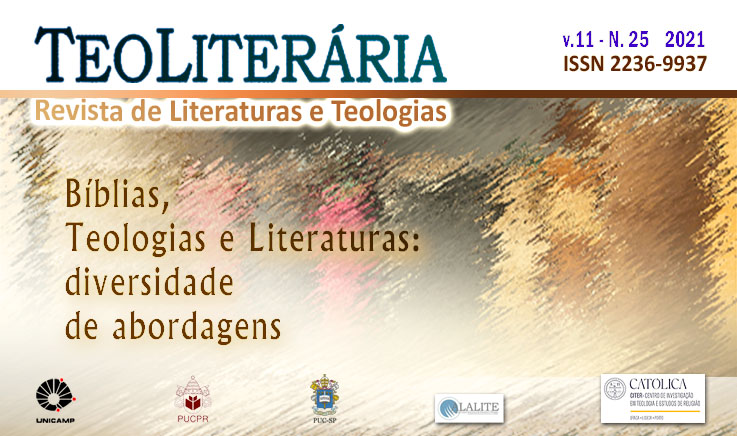A compaixão do pai no centro do enredo da parábola do filho perdido e reencontrado (Lc 15,11-32)
DOI:
https://doi.org/10.23925/2236-9937.2021v25p106-131Palavras-chave:
Evangelho de Lucas, parábola, análise narrativa, filho pródigo, filho perdido e reencontradoResumo
Este artigo objetiva investigar a parábola do filho perdido e reencontrado (Lc 15,11-32), mais conhecida como do “filho pródigo”, pelo método da análise narrativa, demonstrando a centralidade da compaixão paterna na perícope. A análise do narrador segue as categorias de Genette e os demais operadores de leitura da narrativa são analisados a partir de Ska e de Marguerat e Bourquin. O enredo foi divido em três cenas, as quais colocam os personagens em relação com a casa paterna e com o próprio pai. No enredo, a atitude de “mover-se de compaixão” (v. 20) configura-se como o ponto de mudança da narrativa, pois dá início a uma série de transformações que solucionam o conflito da trama. Lucas constrói um jogo de releituras e analepses que colocam em posição central a acolhida do pai ao filho. Pelo efeito de acúmulo construído pelo uso de três parábolas em uma sequência narrativa, e pela identificação do narrador e narratário intradiegéticos, fica claro que a opção do relato não é pela proposta de rechaço feita pelo filho mais velho, mas pela compaixão do pai, já que a própria opção de Jesus é acolher os pecadores e com eles compartilhar a vida (Lc 15,3).Referências
BOCK, P. L. Luke 1:1–9:50. Grand Rapids: Baker Academic, 1994.
BOVON, F. El Evangelio según San Lucas. Vol. III. Salamanca: Sígueme, 2005.
CATENASSI, F. Z.; PERONDI, I. Bíblia e ciências da linguagem: recursos literários e cenas-tipo no Evangelho de Lucas. Teoliterária, São Paulo, v. 9, n. 17, 2019: 338-358. https://revistas.pucsp.br/index.php/teoliteraria/article/view/39397/28507
DRURY, J. Lucas. In: ALTER, R.; KERMODE, F. Guia literário da Bíblia. São Paulo: Fundação da Editora da Unesp, 1997, p. 449-471.
FITZMYER, J. A. El Evangelio según Lucas. Vol. III. Madrid: Cristiandad, 1986.
FUNK, R. W. The poetics of Biblical narrative. Sonoma: Polebridge Press, 1988.
GENETTE, G. O discurso da narrativa. 3. ed. Lisboa: Veja, 1995.
GOURGES, M. As parábolas de Lucas: do contexto às ressonâncias. São Paulo: Loyola, 2005.
GREEN, J. B. The gospel of Luke. Grand Rapids: Eerdmans, 1997. (The New International Commentary on the New Testament).
HARNISCH, W. Las parábolas de Jesús: una introducción hermenéutica. Salamanca: Sígueme, 1989.
HENRIQUES, C. C. Estilística do discurso. Rio de Janeiro: Elsevier, 2011.
JEREMIAS, J. Las parábolas de Jesús. 3. ed. Estella: Verbo Divino, 1974.
KERMODE, F. Introdução ao Novo Testamento. In: ALTER, R.; KERMODE, F. Guia literário da Bíblia. São Paulo: Fundação da Editora da Unesp, 1997, p. 403-415.
LEONEL, J.; TONIOLO, R. C. As voltas do filho pródigo, de Autran Dourado, e a parábola bíblica. Cerrados, Brasília, v. 29, n. 53, 2020: 250-283. https://periodicos.unb.br/index.php/cerrados/issue/view/1944/529
MARGUERAT, D.; BOURQUIN, Y. Para ler as narrativas bíblicas: iniciação à análise narrativa. São Paulo: Loyola, 2009.
MARSHALL, I. H. The gospel of Luke. Carlisle: The Paternoster, 1978.
MENDONÇA, J. T. A construção de Jesus: a dinâmica narrativa de Lucas. São Paulo: Paulinas, 2019.
PERONDI, I. A compaixão de Jesus com a mãe viúva de Naim (Lc 7,11-17): o emprego do verbo splangxizomai na perícope e no Evangelho de Lucas. Tese (Doutorado em Teologia Bíblica). Rio de Janeiro: Pontifícia Universidade Católica do Rio de Janeiro, 2015.
PERONDI, I.; CATENASSI, F. Z. Quando se vive como irmãos há bênção e vida para sempre! Uma análise do salmo 133. Estudos Bíblicos, Petrópolis, v. 31, n. 122, 2021: 175–188. https://revista.abib.org.br/EB/article/view/253
SKA, J. L. “Our fathers have told us”: introduction to the analysis of Hebrew narratives. Roma: Editrice Pontificio Istituto Biblico, 2000.
Publicado
Como Citar
Edição
Seção
Licença
Copyright (c) 2021 TEOLITERARIA - Revista de Literaturas e Teologias

Este trabalho está licenciado sob uma licença Creative Commons Attribution 4.0 International License.
A TeoLiterária – Revista de Literaturas e Teologias é detentora dos direitos autorais de todos os artigos publicados por ela. A reprodução total dos textos em outras publicações, ou para qualquer outro fim, por quaisquer meios, requer autorização por escrito do editor. Reproduções parciais de artigos (resumo, abstract, mais de 500 palavras de texto, tabelas, figuras e outras ilustrações) deverão ter permissão por escrito do editor e dos autores.



